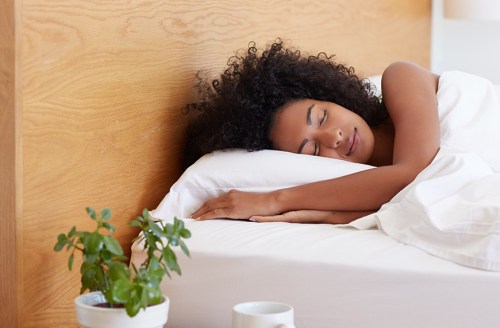This Is *Exactly* How Long You You Can Sleep In Without Confusing Your Body
Whether you got to bed late or simple find yourself exhausted, here's how to sleep in later without messing up your internal clock.

Whether you got to bed late or are just exhausted, it’s tempting to want to sleep in. The last thing you want to do, however, is wreck your sleep schedule and make Monday worse than it already is. But Rebecca Robbins, PhD, sleep expert and postdoctoral researcher at the Brigham and Women’s Hospital and Harvard Medical School, knows exactly how to sleep in later the right way.
“If we sleep in, we’re getting a physiological cue to our body that we’re trying to shift timezones—we call this social jet lag,” says Dr. Robbins. “Whenever you stay up for a party or fun with friends on a Friday night and then Saturday you sleep in, you’re socially imposing jet lag on yourself because your body thinks you’ve hopped in a plane and flown to London, and you’re trying to adjust to that new time zone. So that when the next night rolls around, you are going to be fighting your physiology to fall back asleep and get back on your routine.”
To prevent social jet lag, Dr. Robbins says that you shouldn’t sleep in for more than one hour. “If we change our wakeup time or extend it more than an hour, then that is detrimental for our sleep,” says Dr. Robbins. “Sleeping in is not ideal when it’s longer than an hour away from your typical wakeup time during the workweek. Sleeping in for 30 to 45 minutes, that can be okay.”
What about those nights where you’re up so late that an extra hour isn’t gonna cut it? Dr. Robbins says you still shouldn’t exceed one hour, and instead make up for lost sleep with a mid-day nap.
“If you sleep in, that interferes with your ability to fall asleep and get good rest the next night,” she says. “You want to pay back your sleep debt with a nap. It’s the best way to do that efficiently, without interfering or causing some of the social jet lag.” Even though it’s going to be tough, she says not to sleep in super late and to resist the urge to linger in your bed. Get up and maybe get outside to walk around, go for a run. Later in the day, she says to take a 20-minute power nap, a longer 90-minute nap, or anything in between.
This all has to do with our body’s internal clock, explains Dr. Robbins. When you wake up and start your day, your clock begins its countdown. “This adds to our overall sleepiness so that after 12, 13, 14 hours, we’ve been up for long enough that we are tired and ready for the next night,” she says. Getting up and out of bed provides our body clock with the input that it’s time to start your day.
And if you’re someone who sometimes wants to sleep later than your normal wakeup time but can’t, Dr. Robbins says that means you’re a really good sleeper.
“If you wake up without an alarm clock at the same time Monday to Monday, that’s actually a sign that you are an all-star sleeper,” she says. “And you have a really good, you know well-programmed internal clock and you’re consistent with your sleep schedule.”
Sign Up for Our Daily Newsletter
Get all the latest in wellness, trends, food, fitness, beauty, and more delivered right to your inbox.
Got it, you've been added to our email list.










